- Why is a resume headline for freshers important?
- Best Resume Headline Examples for Freshers
- Tips for writing resume headlines for freshers
- What is a resume headline?
- Why is a resume headline important?
- Tips to write resume headlines for freshers/ professionals
- Difference between resume headlines and resume titles
- Resume headline examples
- Conclusion
- Frequently Asked Questions
- What is an 'About me' section?
- Importance of the 'About me' in resume
- How to write an 'About me' section in a resume?
- 'About me' section resume examples
- Tips for writing the 'About me' section
- Bottom Line
- What is a resume summary?
- What makes a good resume summary?
- Format of a resume summary
- Do you really need a resume summary?
- How to write a resume summary?
- Resume summary examples
- Resume summary for job roles: Sample accomplishments to highlight
- A quick recap!
- Frequently Asked Questions (FAQs)
- What is the Declaration in a Resume?
- Declaration in Resume vs. Curriculum Vitae (CV)
- Samples of Declaration in Resume
- Where to Place Your Declaration for Maximum Impact
- Beyond the Declaration: Optimizing Your Entire Resume
- Frequently asked questions (FAQs)
- What Is An ATS?
- How Does An ATS Work?
- Key Features Of An ATS-Friendly Resume
- Common Mistakes To Avoid When Making Resumes ATS-Friendly
- Steps To Create An ATS-Friendly Resume (That Actually Gets Seen)
- An ATS-Friendly Resume is Great - But Guidance Takes it Further
- ATS-Friendly Resume Template
- ATS-Friendly Resume Checklist
- Conclusion: Beat The Bots, Impress The Humans
- Frequently Asked Questions
- What is a resume?
- Tips for creating the best resume
- What Makes the Best Resume Format for Freshers?
- Sample Resume Formats For Freshers 2025
- Conclusion
- Frequently Asked Questions (FAQs)
- Resume Objective Examples: What is a Resume Objective?
- How to Write a Good Resume Objective for Freshers?
- Why Do I Need a Resume Objective?
- When to Use a Resume Objective?
- 100+ Resume Objective Examples for Different Profiles for Freshers
- Quick Tips for Freshers/Candidates With No Experience
- How to include strengths in resume [for freshers & experienced]?
- Difference between key strengths and skills
- Importance of strength in resume for freshers
- Best strengths to list on your resume
- Tips For Adding Strengths in Resume
- How To Select The Right Skills For Resume?
- How To Write Skills In A Resume?
- Types Of Skills: Hard Skills vs. Soft Skills
- Key Skills For Resume: Hard & Soft Skills
- Key Skills For Jobs
- Common Pitfalls To Avoid When Listing Skills For Resume
- Summing Up
- Frequently Asked Questions
- What Are Soft Skills?
- Why are Soft Skills Important?
- Soft Skills vs Hard Skills
- Top 8 Soft Skills You Need In 2024
- Soft Skills For Resume for Different Work Profiles
- 8 Ways To Improve Your Soft Skills
- Frequently Asked Questions (FAQs)
- How To Explain A Gap In Your CV
- 5 Tips On How To Fill A Gap In Your CV
- COVID-19 Impact: Managing Gaps in CV Due to Unemployment
- Sample Resume with Employment Gap
- Navigating Interviews: Articulating CV Gaps
- Frequently Asked Questions (FAQs)
- Hobbies and Interests: Meaning & Importance
- When to include hobbies and interests in resume?
- Difference Between Interests & Hobbies For Resume
- Attractive Hobbies for Resume & Their Importance
- Quick List of Hobbies To Add in Resume [80+ Examples]
- Job-Relevant Hobbies And Interests For Resumes
- Selecting Interests And Hobbies For Resume: Points To Remember
- Summing up
- Importance Of Project Description In Resume
- Strategies For Listing Projects On Resume
- Where To Place Projects In Resume
- Essential Project Details For Resume
- Highlighting Academic & Personal Projects
- Including Freelance & Contract Work Projects
- Addressing Non-Disclosure Agreements In Project Descriptions
- Dos & Don'ts For Project Description In Resume
- Project-Based Resumes For Career Changers & Freshers
- Frequently Asked Questions (FAQs)
- What Is an MBA Resume?
- Key Sections of an MBA Resume
- Formatting an MBA Resume
- Resume Samples For MBA Graduates
- Tips to Make your Resume Stand Out!
- Conclusion
- Frequently Asked Questions
- Never create a one-for-all resume
- Add an achievement section
- Design a resume that suits the job profile
- Don’t skip information
- What is a Cover Letter for Resumes?
- Format to Write a Great Cover Letter for Resumes
- Tips to Get Hired With the Perfect Cover Letter
- Sample Cover Letters for Resume
- Frequently Asked Questions
How To Explain A Gap In Your CV: Must-Know Tips For Young Professionals

Though it’s a common belief that working professionals simply move from one job to another, there can, in fact, be gaps in their professional careers. However, potential employers often view gaps in CVs with doubt. Thus, it’s important to know how to explain a gap in your CV so you can effectively explain it to employers and increase your chances of securing a job.
A gap in your CV refers to a period of time where there is no employment or educational experience listed. These gaps can be due to various reasons, such as taking a break to travel, personal circumstances, or difficulty in finding suitable employment.
Career gaps are a common occurrence in many people's careers and should not be viewed as a negative reflection of your abilities or commitment.
How To Explain A Gap In Your CV
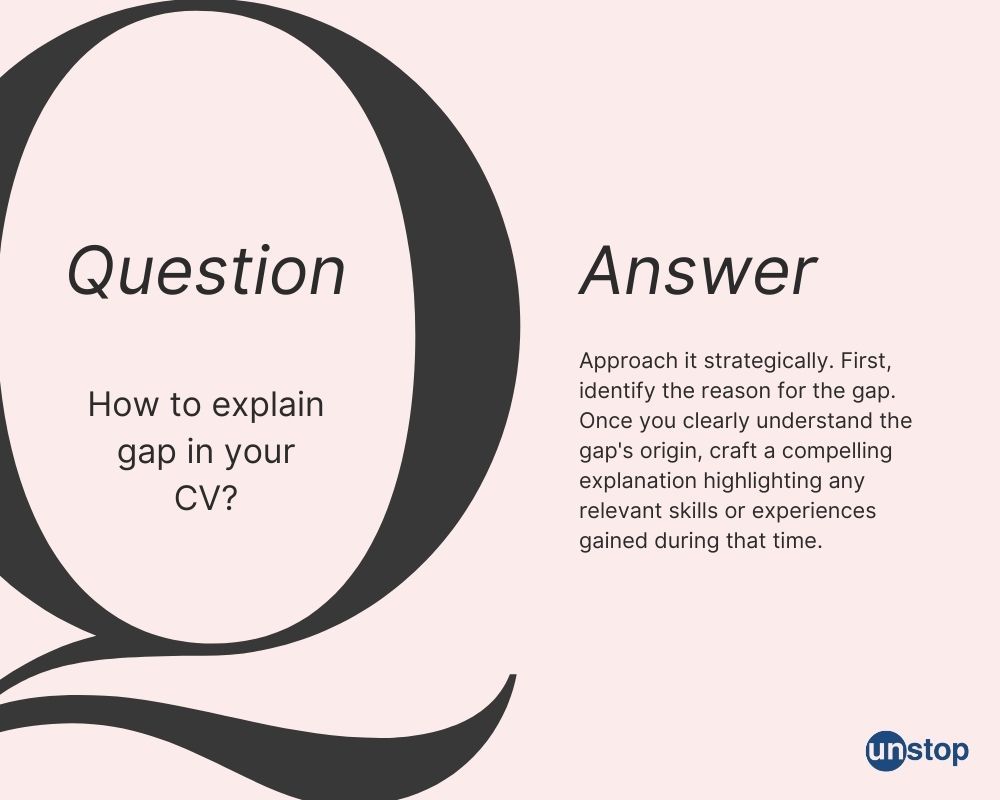
When faced with a CV gap, approach it strategically. Start by identifying the reason for the gap, whether it was due to personal circumstances, career exploration, or further education. Once you have a clear understanding of the gap's origin, you can craft a compelling explanation that highlights any relevant skills or experiences gained during that time.
For example, if you took a break to travel, emphasize the cultural awareness, communication skills, and problem-solving abilities you developed during your journey. If you pursued further education, highlight the knowledge and expertise you gained in your field of study. By highlighting the positive aspects of your gap, you can present yourself as a well-rounded candidate who has used their time wisely and is ready to bring valuable skills to their next role.
Here are some common reasons for a gap in CVs:
-
Personal circumstances (e.g., illness, family responsibilities)
-
Career exploration or change
-
Pursuing further education or training
-
Unemployment or job loss
-
Travel or sabbatical

5 Tips On How To Fill A Gap In Your CV
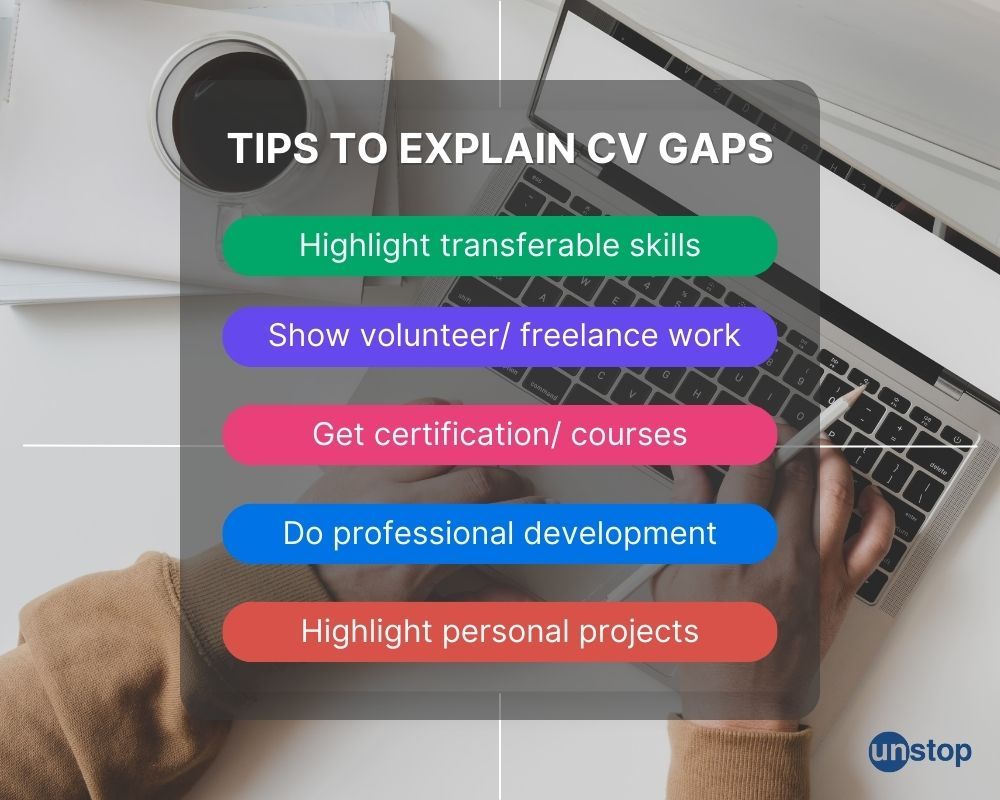
Highlighting Transferable Skills
One way to address an employment gap is by highlighting the transferable skills you gained during your gap period. For example, in case of an absence due to health concerns or redundancy, you may not have been working in a traditional job setting. But you likely acquired valuable skills such as resilience, adaptability, problem-solving abilities, and time management skills. These skills can be applicable in various industries and can demonstrate your ability to overcome challenges.
Similarly, if you took time off to fulfill caregiving responsibilities, particularly for childcare, you can showcase your ability to multitask and prioritize. You can also emphasize problem-solving skills and highlight communication and interpersonal skills.
Emphasizing Any Volunteer Work or Freelance Projects
If you engaged in volunteer work or took on freelance projects, make sure to highlight these experiences on your CV. Volunteering demonstrates your willingness to contribute positively even when facing personal challenges. Similarly, freelancing indicates that even during your gap, you were able to utilize your skills and contribute to projects on a professional level.
Discussing Relevant Certifications or Courses
If you took the opportunity to further your education or gain relevant certifications, be sure to include this information in your CV. It shows potential employers that despite the employment gap, you actively sought out opportunities to enhance your knowledge and skills in order to stay competitive in the industry. Whether it's completing an online course, obtaining a certification related to your field, or attending workshops and seminars - these accomplishments can help bridge the gap and demonstrate your commitment to professional growth.
Staying Active/Professional Development During the Unemployment Period
Recruiters are interested in candidates who remain engaged with their industry even during periods of unemployment. When explaining gaps in your resume due to unemployment, make sure to discuss the steps you took to stay connected and involved with your industry. For example, talk about attending industry conferences or networking events where you have opportunities to learn from experts and connect with potential employers. You can also mention any articles, blog posts, or research papers related to your field that you wrote or contributed to during this time.
Showcasing Personal Projects
Discuss any entrepreneurial ventures or side businesses you started during the gap period. Consider the following examples:
-
Personal projects: Developing websites, creating mobile applications, or designing marketing campaigns are all excellent ways to showcase your skills and dedication outside of formal education.
-
Research initiatives: Conducting research on topics related to your field of interest shows intellectual curiosity and passion.
This demonstrates initiative, self-motivation, and a proactive approach towards learning. It also showcases your ability to turn adversity into opportunity and showcases your entrepreneurial spirit.
Remember, honesty is key when discussing gaps in employment history with potential employers. Also, be sure to tailor your explanations based on the specific requirements of each job application and use a functional resume format if needed. With a well-crafted explanation, you can confidently address any employment gaps and demonstrate your value as a potential employee.
COVID-19 Impact: Managing Gaps in CV Due to Unemployment
COVID-19 pandemic significantly impacted the global economy. The result - widespread unemployment and job loss. Many individuals experienced gaps in their CVs due to periods of unemployment during this challenging time. Here’s how to explain a gap in your CV due to unemployment (whether due to the pandemic or any other reason):
Your dream internship is just a click away. Start applying now!
Remote Work Opportunities
During the pandemic, many companies transitioned to remote work setups. If you were fortunate enough to have taken advantage of these opportunities, it's crucial to highlight them when explaining a gap in your CV. Discuss any freelance projects, contract work, or remote positions you pursued during lockdowns. Emphasize the skills you acquired and how they align with the position you're applying for.
Virtual Networking: Staying Connected to Your Industry
Networking is essential for career growth, and staying connected to your industry is important. Explain how you maintained professional connections through virtual networking events or online community platforms. Mention any webinars or conferences you attended virtually where you gained insights into industry trends or made valuable connections.
Apart from these, you can also rely on the multiple ways to manage gaps in your resume mentioned above, such as professional development, volunteering, gaining certifications, etc.
Sample Resume with Employment Gap: Formatting Tips
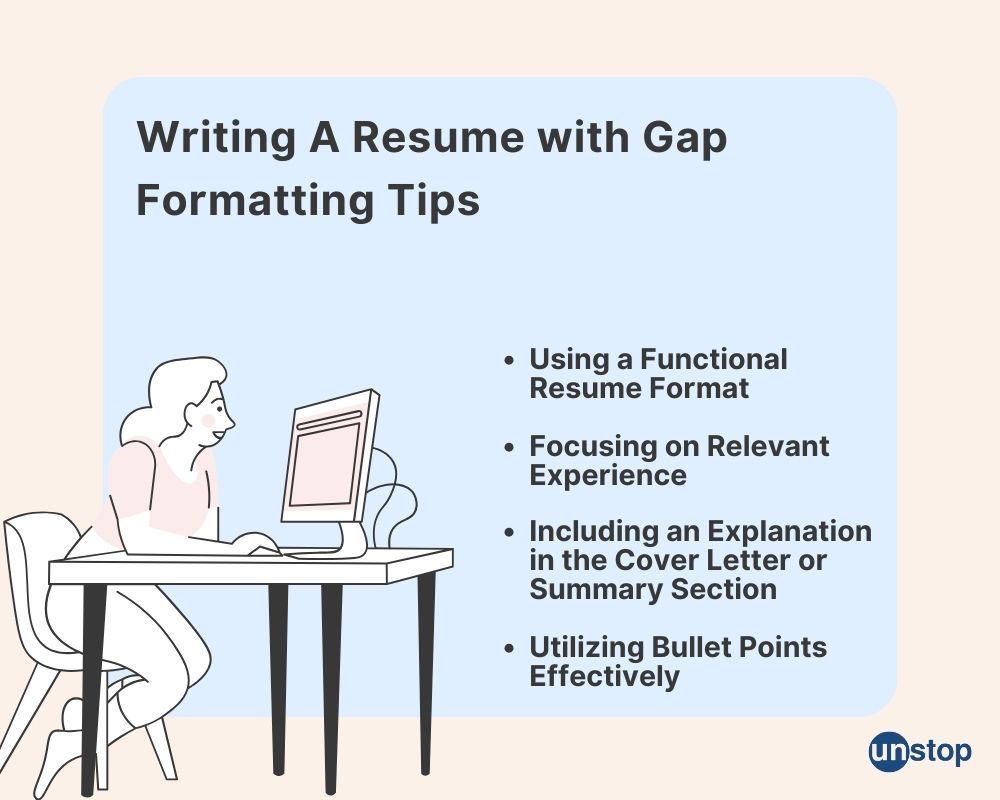
Using a Functional Resume Format
When explaining a gap in your CV, one effective approach is to use a functional resume format. This format focuses on highlighting your skills and achievements rather than emphasizing the chronological order of your work experience. By using this format, you can draw attention away from the employment gap and showcase your abilities.
Focusing on Relevant Experience
Instead of dwelling on the employment gap, it's important to focus on relevant experience that you have gained during that time. Highlight any freelance work, volunteer positions, or personal projects that are applicable to the job you are applying for.
Including an Explanation in the Cover Letter or Summary Section
While it's not necessary to provide an extensive explanation for the employment gap directly on your resume, it can be helpful to address it briefly in your cover letter or summary section. Use this opportunity to explain why there was a gap and how you utilized that time effectively. Be honest and transparent about any personal circumstances or professional decisions that led to the break in employment.
Utilizing Bullet Points Effectively
To draw attention away from the employment gap, consider using bullet points strategically within your resume. Structure each bullet point as an achievement or responsibility related to a specific job or project. By presenting information in this concise manner, you can capture the reader's attention and highlight your accomplishments without focusing too heavily on any gaps.
Sample Resume:
Name: Rahul Sharma
Contact Details: 9XX87XX101Objective: Highly skilled front-end developer with 4 years of experience seeking a challenging position to utilize my expertise in creating responsive and user-friendly websites. During this period of six months (January 2022 - June 2022) I was unable to work due to a personal injury. However, I took this time to focus on improving my skills and staying updated with the latest front-end development trends. I completed online courses and worked on personal projects to enhance my knowledge and expertise.
Skills:
Proficient in HTML, CSS, and JavaScript
Experience with front-end frameworks such as React and Angular
Strong understanding of UI/UX principles
Knowledge of responsive web design
Familiarity with version control systems like Git
Excellent problem-solving and debugging skills
Experience: ABC Company (2017-2021)
Developed and maintained responsive websites using HTML, CSS, and JavaScript
Collaborated with cross-functional teams to deliver high-quality projects within deadlines
Implemented UI/UX best practices to enhance user experience
Optimized website performance through code optimization and browser compatibility testing
Education: Bachelor of Science in Computer Science (2016) XYZ University
Certifications & Projects:
Front-End Web Development Certification (2020)
JavaScript Fundamentals Certification (2018)
Developed a responsive e-commerce website using React and Redux
Created a portfolio website to showcase my skills and projects
Implemented a user authentication system using Firebase
Navigating Interviews: Articulating CV Gaps with Confidence
One question that often makes candidates feel uneasy is explaining a gap in their CV. However, with some preparation and a positive mindset, you can confidently address this topic. Here are some tips to help you navigate interview questions about CV gaps:
-
Preparing honest and concise responses to questions about CV gaps. Practice so that you can deliver answers smoothly and confidently during the interview.
-
Be prepared to discuss the reasons behind the gap, such as personal circumstances, career changes, or further education.
-
If the reason behind your CV gap is due to past mistakes or challenges, it's important to demonstrate self-awareness and highlight how you have learned from those experiences. Discuss how you have taken steps towards personal improvement and professional development during the gap period.
-
Avoid dwelling on the gap too much; instead, shift the focus towards your qualifications and how you can contribute to the company. Frame CV gaps as opportunities for highlighting any positive outcomes resulting from the gap (e.g., career change, new skills).
-
Be confident in your response and maintain a positive attitude throughout.
Remember, everyone faces different circumstances in their career journey, and employers understand that. By articulating your CV gaps with honesty, framing them as opportunities for growth, demonstrating self-awareness, and highlighting positive outcomes, you can navigate interview questions about CV gaps with confidence.
Frequently Asked Questions (FAQs)
1. How should I explain an extended period of unemployment?
It is important to be honest about any extended periods of unemployment on your CV. Instead of leaving it unexplained or making excuses, focus on highlighting any productive activities you engaged in during that time, such as volunteer work, freelance projects, or personal development initiatives.
2. Should I include all my employment history even if there are significant gaps?
While it's generally recommended to include all relevant work experience on your CV, if there are significant gaps that do not contribute positively to your application, it might be best to omit them. However, if asked about these gaps during an interview or application process, be prepared with a truthful explanation.
3. How do I address a gap caused by personal reasons like family responsibilities?
When explaining a gap caused by family responsibilities such as caregiving or childcare reasons, emphasize transferable skills developed during that time, like organization, multitasking, and problem-solving. Highlight any relevant experiences or achievements in these areas to demonstrate your ability to balance work and personal responsibilities effectively.
4. What if my CV gap was due to a career change or further education?
If you have a gap in your CV due to a career change or pursuing further education, focus on the transferable skills gained during that period and how they can benefit your prospective employers. Emphasize any relevant coursework, certifications, or projects completed during this time to showcase your commitment to professional growth.
5. How should I handle CV gaps caused by the COVID-19 pandemic?
It is widely understood that many individuals may have experienced gaps in their CVs due to the impact of the COVID-19 pandemic on employment. Be transparent about the circumstances and highlight any remote work, online courses, or personal projects you undertook during this period to demonstrate your adaptability and resilience.
You might also be interested in reading:
I’m a reader first and a writer second, constantly diving into the world of content. If I’m not writing or reading, I like watching movies and dreaming of a life by the beach.
Login to continue reading
And access exclusive content, personalized recommendations, and career-boosting opportunities.
Subscribe
to our newsletter











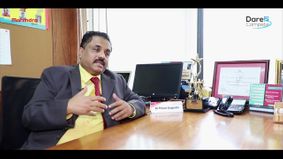

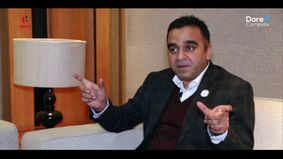
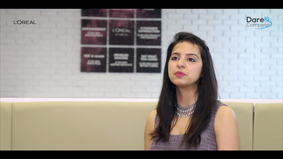
Comments
Add comment